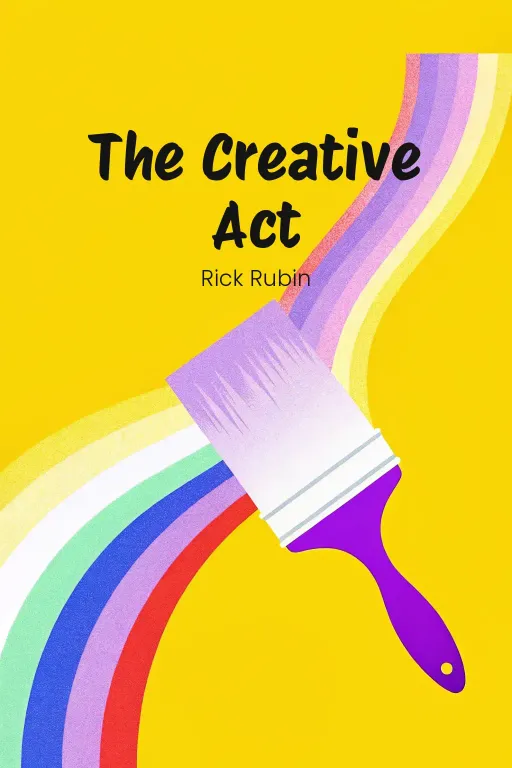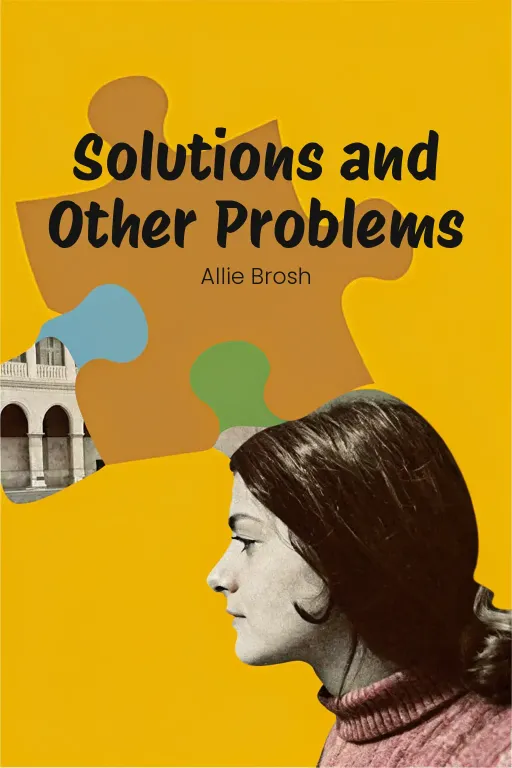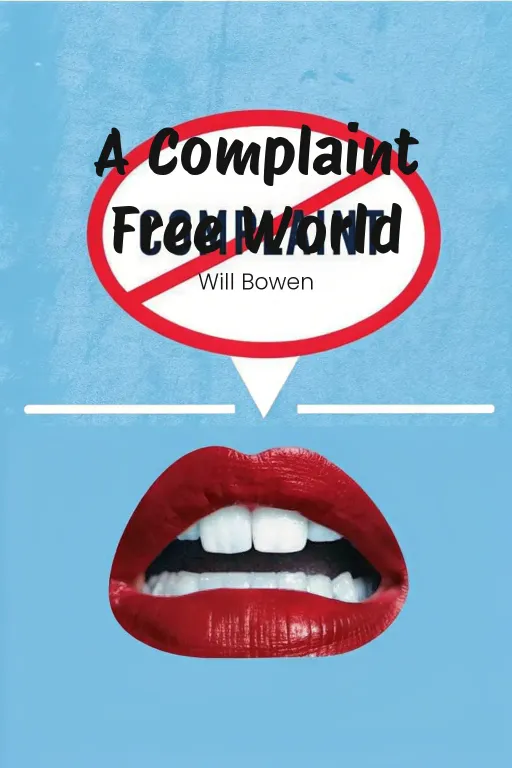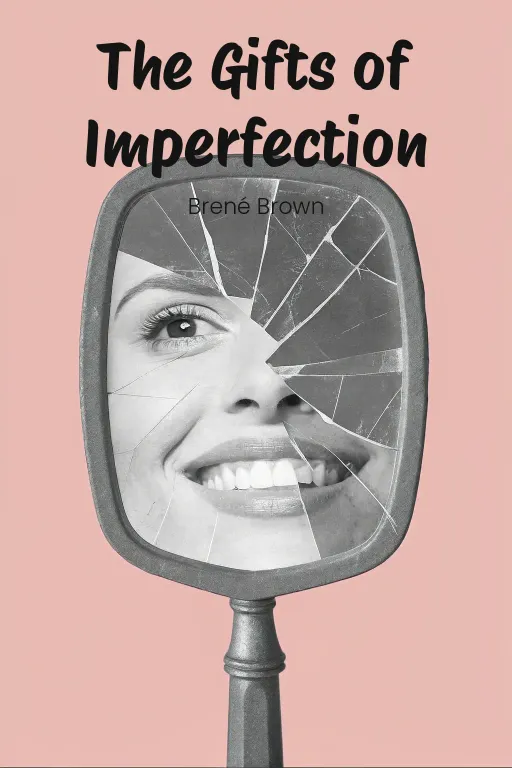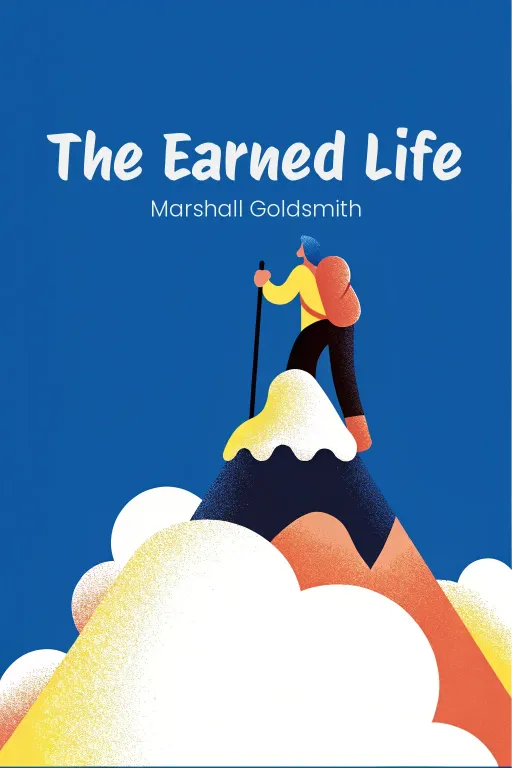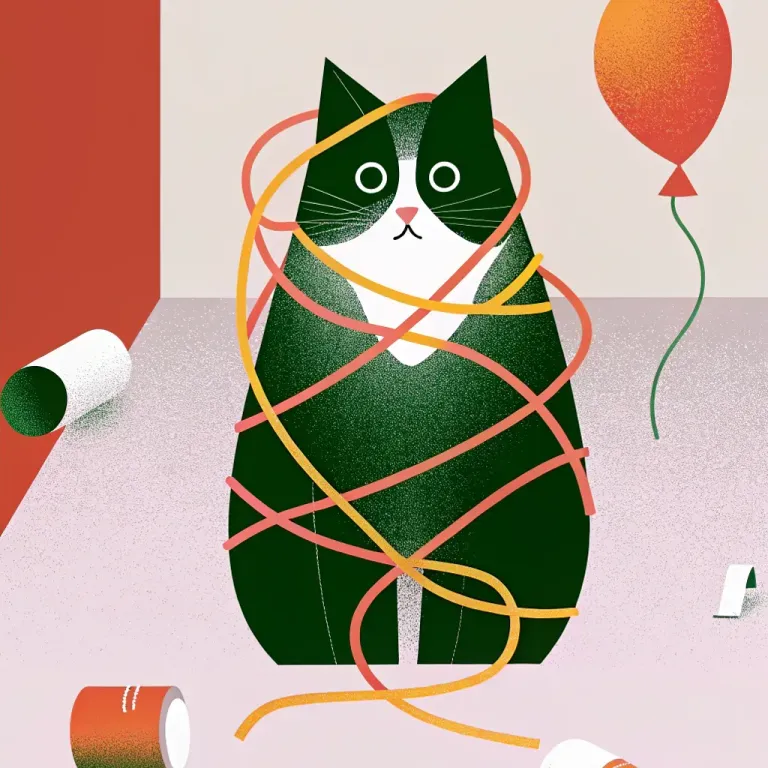
Chaos & Crayons: Finding Your Thread
Podcast by Beta You with Alex and Michelle
Chaos & Crayons: Finding Your Thread
Part 1
Alex: Hey everyone, welcome back to the show! You know, the one where we try to make sense of the beautiful mess that is life. Michelle: Or, failing that, at least get a few laughs out of it. Seriously, what else can you do but laugh sometimes? Alex: Exactly! And that's what we're tackling today... this whole dance of chaos and meaning in the human experience. Remember being a kid and turning something totally random into the most important thing ever? Like forming a deep bond with a housefly or getting heartbroken over a crayon? You know. Michelle: Ah, so you mean, me yesterday still crying over a code bug. Just replace "crayon" with "promotion" or, like, that missing sock that throws off my whole morning. Same thing, right? Alex: Precisely! Today, we're diving into a book that nails these chaotic contradictions... that tug-of-war between laughter and tears, randomness and purpose. It serves up these funny, insightful little stories about being a kid, navigating relationships, and even wrestling with those big, unanswerable questions we all try to avoid. Michelle: Okay, so what's on the menu for today's discussion? We have balloons and chaos... because, really, what's a better symbol for life's unpredictability than a balloon string drifting behind a truck? Alex: Then, we're untangling the mess of human relationships. What is it about our connections friendships, family grief how they are so messy? Also, how they can be so wonderfully disastrous. Michelle: Right, and we'll wrap it all up with the weird, the absurd, and the personal growth that comes from just embracing all of it. I'm guessing a cat or two might be involved? Alex: Whether you're someone who's constantly searching for life's grand meaning or you're just along for the roller coaster, hopefully there's something here for you. So, let’s dive in!
Embracing Life’s Absurdity
Part 2
Alex: Okay, so let's dive into this first story – a balloon tied to a truck, flapping in the wind. On the surface, it's such a simple image, but somehow, it just nails the feeling of how absurd life can be. You're driving along, maybe thinking about work or what to have for dinner, and bam, suddenly there's this balloon that completely takes over your thoughts. Michelle: Exactly, and it's so ordinary, isn't it? No one attaches a balloon to a truck expecting it to become “some profound metaphor for existence”, and there it is, just careening around. I always find myself What are you actually supposed to do in that situation? Pull over and explain physics to the wind? Alex: Precisely! That laughter isn't just a reaction; it's a kind of release. It's realizing that, hey, the world is unpredictable, and you can't control everything. Kind of humbling, but also strangely comforting. Michelle: Comforting? Maybe if you're the one watching from the side of the road. But if you're the poor soul who tied the balloon to the truck, you're probably just annoyed that your party decoration has turned into a philosophical statement. Alex: Maybe that's the point, though. The balloon represents how we try to cling to some kind of order – a tightly tied string, carefully made plans – but the absurdity comes when we watch those plans fall apart anyway. Michelle: Right, but why does “chaos” speak to us so much? Why does a balloon acting crazy become this intellectual and emotional moment? Is it because we've all been that balloon? Just flapping around, being pulled in directions we didn't ask for? Alex: I think you've hit on something there. We've all had those times when we felt like we were flailing – when everything felt out of control. That silly little balloon brings those feelings to the surface, but in a way that makes them… manageable. You laugh at the metaphor, and it somehow calms you down. Michelle: Hmm. So, the conclusion is: The next time life makes you feel like a badly tied balloon, just pull over, laugh, and let strangers judge you from their cars? Alex: In a way, yes! It's about giving yourself permission to embrace the chaos rather than fight it. Let's be real, flailing isn't the exception, it's the norm. Michelle: That should be our tagline: "Flailing – It’s the Default." Okay, moving on from balloons to… sardines. Alex: Ah yes, the sardine saga. A toddler, a dead fish, and a lot of misguided but adorable determination. Michelle: Seriously, that kid deserves a medal for perseverance. How many of us adults put that much effort into “anything”, let alone trying to bring a sardine back to life? Alex: But that’s what makes it so touching! The child's constant efforts – blowing on it, singing to it, genuinely believing it will come back – reflect an untainted hope that we tend to lose over time. Even if it looks ridiculous. Michelle: Yeah, but isn't there also a bit of denial in that? As adults, we'd look at that sardine and think, "Okay, that sardine's a goner. Moving on." But this kid can't let it go, which seems almost… pointless? Alex: Pointless, sure, but also deeply human. I think what the child’s doing is instinctive—when we’re faced with something broken or lifeless, there’s an urge to “fix”. It might not be rational; it might not even make sense. But it’s part of how we process loss or discomfort. Michelle: So, you're saying deep down we’re all just toddlers still metaphorically singing to dead sardines? Alex: In a way, yes. When you think about it, aren't art, love, even conversations like this, about trying to bring something intangible to life? Whether it's ideas, connections, or understanding. Michelle: I see what you mean. But it's amazing how this little scenario – a kid and a dead fish – taps into huge themes of effort and hope. Which, honestly, feels both inspiring and a bit depressing. Alex: That contrast is what makes it so powerful. Yes, the child’s effort is "doomed" from the start, but the act of trying itself has value. It reminds us that even small, seemingly meaningless acts of hope can have a huge emotional impact. Michelle: Okay, so one lesson is "Life's chaos is laughable," and the other is "Believing in something, even foolishly, gives life meaning." Am I keeping up? Alex: You got it! Both the balloon and the sardine are absurd situations that somehow reflect deeper truths about the human condition. They remind us that life isn’t about having all the answers – it’s about wrestling with the questions, even when they’re messy or irrational. Michelle: Okay, but I have to ask – do you think the kid actually learned anything from that experience? Or did they just move on to the next random thing? Alex: That’s the beauty of it – they may “not” have consciously learned anything, and that’s okay. Sometimes the lessons from chaos show up much later, often without us even realizing it. Michelle: So, basically, life's absurd moments are like little philosophical traps waiting to spring on us later on? Alex: Exactly. And instead of trying to avoid them, maybe we should lean into them, let them shake us up, and teach us something – eventually. Michelle: Leaning into chaos. You make it sound like we're all just one metaphor away from becoming philosophers armed with party balloons and sardines. Alex: Well, isn’t that kind of the point? The absurdity of life is all around us – if we're paying attention, it can be both hilarious and deeply transformative.
Navigating Relationships and Misunderstandings
Part 3
Alex: This deep dive into life's unpredictability naturally leads us to consider how we navigate relationships in the midst of it all, right? I mean, if we're all just kind of stumbling through life, how could that “not” affect how we connect with other people? Michelle: Totally. Relationships are already complex enough as it is, even without all the chaos thrown in. What's fascinating is how those moments of misunderstanding, you know, especially the big or ridiculous ones, really stick with us. Like the neighbor story—it's such a classic snapshot of childhood curiosity gone sideways. Alex: Oh, the Richard story! It's such a great example of how that overwhelming desire to connect can just completely override social boundaries and rational thought, isn't it? You've got this guy, just living his life, and he becomes this kid's personal puzzle to solve. It starts out innocently enough, watching him, wondering about him, but then it's like the kid creates this whole narrative around him. Michelle: Right, and then it escalates to full-on heist mode! A shoe? A credit card bill? The kid's basically running an archaeological dig in this guy's house. It's so absurd, but also, you know, really relatable. I mean, who hasn't let their imagination run wild and completely misinterpreted someone or something? Alex: Exactly! And that's where the humor and the poignant part of the story come together. For the child, it's not about being malicious, it's about curiosity, a desire to make some kind of connection, even if it's totally inappropriate. But at the same time, it's a wake-up call about respecting boundaries. Richard's life becomes this accidental lesson in how relationships need more than just “taking” pieces of someone's existence. Michelle: You know what's funny? I bet if Richard had known, he would've been both baffled and maybe a little flattered. Like, "Oh, my credit card bills are fascinating? Huh, who knew?" Alex: Exactly! There's a real absurdity to those first encounters with social norms, isn't there? The moment when the narrator proudly tells his parents, "I've been hanging out with Richard," it's so cringeworthy, but also so honest. It's childhood logic at its finest—taking something completely subjective and treating it like it's the absolute truth. Michelle: And isn't there a bigger lesson there about how we approach relationships even as adults? I mean, okay, maybe we're not literally crawling through dog doors and stealing shoes, but aren't we all guilty of creating these ideas about people that don't really match who they are? Alex: Oh, absolutely. We carry those skewed assumptions into adulthood, especially in new relationships, whether they're romantic or not. We build up these mental narratives based on little fragments—a text, a social media post, a quick chat—and we treat them as the whole picture. It's less obvious than the "Richard scenario," for sure, but it's the same thing: trying to solve a puzzle when you're missing most of the pieces, and just filling in the blanks with your own assumptions. Michelle: Right, and then when reality hits us—like, the neighbor doesn't even know our name—we're left with that feeling of embarrassment or awkwardness. But those moments of dissonance are how we learn, right? And it makes you wonder, did Richard ever get any explanation? Did anyone ever say, "Hey, sorry about the shoe... Our kid thought you were some kind of neighborhood Indiana Jones"? Alex: We may never know. But you bring up a good point, closure is often hard to come by in these kinds of misunderstandings. Sometimes, you just have to take the lesson and move on, and well, that has to be enough. Michelle: Alright, so if Richard is all about how boundaries shape relationships, then the sardine story kind of flips that, doesn't it? It's less about physical boundaries and more about the limits of “emotional” connection. I mean, a toddler trying to befriend a dead fish sounds ridiculous, but it's actually... kind of profound. Alex: It really is. It shows how early on we start dealing with the idea of connection—and rejection. That toddler looks at a sardine and just thinks, "Why not? Why can't we be friends?" There's something really pure about that optimism, even if it's maybe a little misplaced. Michelle: What gets me is the sheer determination! Blowing on it? Giving it pep talks? Singing heartfelt songs? That kid put more effort into that relationship than most people put into real friendships. Alex: True, but the beauty of it is in that unwavering effort, don't you think? The toddler doesn't see impossibility; they see potential. And while adults might call that naive, I think there's a real lesson to be learned from it—about putting energy into connections, even when the odds are against you. It's emblematic of how relationships, at their best, are built on hope. Michelle: But there's a bittersweet side to it too, right? Because eventually, whether it's a sardine or something more meaningful, we all have to face the fact that not every connection we try to make is going to work out. Alex: Exactly. And that realization can be tough. But it also doesn't make the effort meaningless, right? The child didn't "succeed" in bringing the fish back to life, sure, but that moment became part of their understanding of effort, hope, and even loss. The sardine wasn't just a sardine, it becomes, in retrospect, almost a metaphor for acceptance. Michelle: It's amazing how we keep coming back to these big themes through these really ordinary events. I mean, who knew we'd be getting all philosophical about stolen shoes and sardines? Alex: That's the magic of these stories, isn't it? They take the simplest, most absurd moments and reveal the deeper truths underneath. Whether it's curiosity gone wild or a child refusing to give up on a lifeless fish, these stories remind us that misunderstandings and mistakes are just part of being human. They're how we grow. Michelle: So, to sum it up: Don't crawl through your neighbor's dog door, maybe don't try to revive sardines, but definitely embrace the chaos and see what it can teach you, yeah? Is that about right? Alex: Perfectly put.
Self-Discovery and Acceptance
Part 4
Alex: So, understanding these relational dynamics really sets the stage for looking inward, right? For personal growth and self-discovery. This brings us to the last part of our conversation today – self-discovery and acceptance. Because eventually, all this messy, external chaos we've been talking about turns inward. The question becomes, how do we, as individuals, come to terms with our vulnerabilities, our quirks, and imperfections while navigating all of life's unpredictabilities? Michelle: Right, so we've gone from balloons and sardines to this ultimate, lifelong project: figuring out how to be okay with who we are in the middle of all this madness. It's like life saying, "Congratulations on surviving the external chaos. Now, for the real challenge – yourself." Alex: Exactly. And the stories here are, well, profound. Let's start with one of the most intense scenarios – confronting mortality. The episode about a potential cancer diagnosis, for example, is both terrifying and strangely enlightening. Imagine experiencing months of confusion – fainting spells, unexplained bleeding – nobody can figure out what's going on. Michelle: That already sounds like a medical thriller. Add the fear of cancer hanging over your head, and suddenly it's a psychological endurance test, too. I mean, how do you even function in that in-between space? Where the worst-case scenario looms, but you're still waiting for answers. Alex: That's really the heart of the story – the inescapable uncertainty. The narrator describes how, during that time, it felt like life was paused, but their mind never stopped. There was this endless cycle of imagining farewells, grieving future plans that hadn't even been cut short yet, and staring directly at their own impermanence. It really forces you to reckon with questions we all try to avoid: What does it mean to really live? And what does it mean to let go? Michelle: And the outcome wasn't even remotely what they, or the doctors, expected. This "tumor fruit salad" discovery? I mean, it's absurd on so many levels. Instead of a tumor that spelled doom, it turns out to be... a medley? Like someone accidentally dumped the leftovers from a fruit platter into the anatomy lab, right? Alex: Exactly! That’s what makes it both absurd and profound. On one hand, relief – no cancer. But, on the other hand, the mental scars don't just vanish. They stay with you, because what really changed during those weeks wasn't just a diagnosis; it was the person. That close brush with mortality kind of cracked something open. They faced their fragility head-on, and, in doing so, learned something about resilience. Michelle: And I think the real lesson here is how humor became this survival tool, right? That phrase "tumor fruit salad" is so bizarre, but by reframing the experience that way, it reshapes it. Doesn't erase the trauma, no, but it helps you own it. Like, if I can laugh at my body betraying me in this way, then maybe I have some power over it? Alex: Absolutely. Humor is such a powerful way to process things that might otherwise feel unbearable. By turning something really terrifying into an absurd anecdote, the narrator creates a connection – both with themselves and with anyone who's listening. It's like saying, "Okay, this was real, and it was awful – but we can also laugh at how bizarre it was because that makes it bearable." Michelle: And that connection – to yourself, to others – that's the thread that's really running through all of this, isn't it? Even in isolation, which is such a huge theme here. Like when the narrator moves into their first place alone and suddenly starts having these intense internal dialogues. I mean, isolation, as freeing as it sounds, also means there's nobody there but you and... your thoughts. And let's be honest, that's sometimes terrifying. Alex: Oh, it really is. It’s that echo chamber of your own mind, where every fear, every insecurity gets amplified. The narrator talks about struggling to feel at peace with themselves during that period. And the most vivid example they give is watching that old home video – the two-year-old version of themselves trying to, you know, connect with a sardine. Michelle: Oh, the sardine video again! This poor kid – thinking they could revive a fish through sheer optimism and interpretive dance. I know we've joked about it, but watching that as an adult must have been... sobering. Alex: Completely. What starts as, like, nostalgic laughter quickly shifts to this aching realization. The child in the video – so hopeful, so unencumbered by logic or fear – feels like a stranger now. As though adulthood has buried that boundless optimism under layers of experience and doubt. And that's where self-discovery comes in, right? Figuring out how to reconnect with that childlike belief in possibility, even when it feels naive. Michelle: But, how do you even start that process? I mean, it's not like you can just watch one home video, dust off your inner two-year-old, and call it a day. Most of us... well, we’re not good at befriending ourselves. The way we talk to ourselves is often harsher than we ever would be with anyone else. Alex: It begins with small, deliberate acts. The narrator mentions finding joy in mundane, quirky things – talking to inanimate objects, naming a broken stereo, or even reflecting on the absurdities of their cat's antics. These aren't grand gestures, but they build connection with yourself in a playful, forgiving way. Michelle: Oh, and let's talk about that cat – Squirrel! This anxious ball of fur is like the mascot for embracing quirks. I mean, adopting a cat that seems part chaos incarnate sounds like the perfect metaphor for self-acceptance. Alex: Oh, that’s exactly what Squirrel represents. The narrator and their partner chose this cat not because he was perfect, but because he was imperfect in the most lovable, relatable way. His antics – devouring then immediately rejecting a toy mouse, his inexplicable attachment to random bathroom exiles – are unpredictable, messy, and, frankly, hilarious. Michelle: It almost feels like a mirror, right? Accepting Squirrel is a way of learning to accept themselves. Like, if they can love this eccentric creature with all his quirks, why not extend the same patience to the person looking back at them in the mirror? Have you successfully applied these lessons to your life? Alex: Exactly. The adoption story isn't just about taking in a pet; it's about forging a relationship that thrives on imperfection. And that’s reflecting broader lessons in self-discovery. You don't find peace by erasing what makes you unique. You find it by leaning into your quirks and letting them be part of the story. Michelle: So, what we're learning here is that between a fruit-salad tumor, a dead sardine, and a dramatic cat, life's messiness isn't just unavoidable. It's transformative. As long as we're willing to sit with the discomfort, laugh when we can, and maybe even name the chaos "Squirrel," we end up growing from it. Alex: And that growth comes from embracing the very things we're often tempted to push away – our vulnerabilities, our imperfect relationships, and the absurdity of everyday life. Self-discovery isn't about perfection; it's about finding meaning – and even beauty – in the imperfections. Michelle: Which is great news, because if there's one thing I've learned today, it's that humans aren't exactly built for perfection. Flailing, fumbling, and occasionally finding moments of grace – sounds like a pretty solid summary of the whole episode. Alex: And maybe of life in general.
Conclusion
Part 5
Alex: So, today we dove into some pretty wild stories, right? Balloons taking flight, sardines having a moment, and cats that are just plain dramatic. But somehow, through all that, we touched on life's chaotic beauty. We talked about how those absurd moments, like a balloon slipping from your grasp or a silly childhood misunderstanding, can actually teach us some really profound lessons about hope, connection, and accepting that things will never be perfect. Michelle: Yeah, and let’s not forget the common thread here – that embracing the “flail,” as you put it, is basically the human condition. Whether we're trying to connect with a neighbor, attempting to revive a questionable sardine, or just dealing with our own weirdness amidst the general chaos of existence, it seems like the real meaning of life comes from sticking with it through those small, almost ridiculous acts. Alex: Precisely! These stories are a nudge to lean into the uncertainty, to laugh when things inevitably go sideways, and to actually find meaning because of, not despite, life's imperfections. I think the most important thing is to let ourselves be curious and, yeah, maybe even a little vulnerable, even when we have no clue how things will turn out. Michelle: Okay, so here's a question for you listeners: Where in your life are you clinging too tightly to your metaphorical balloon? Or maybe trying to serenade a sardine back to life? Maybe, just maybe, it’s time to loosen your grip a little, roll your eyes, and just embrace the whole chaotic mess. How would someone apply this to modern urban life? Alex: Definitely! Because, really, it’s the flailing, the fumbling, the laughter – that's what makes life worth sharing, isn't it? And, If you're going through tough time, and can’t quite find clarity in all the madness, you can at least find some kind of humor in it. Michelle: Or name your chaos after a quirky cat like Squirrel. Naming things always seems to give you a little bit of control, right? Alex: Thanks for tuning in today, everyone. We hope you enjoyed it! Until next time, embrace the absurdity, and keep finding meaning in your own beautifully chaotic moments.



